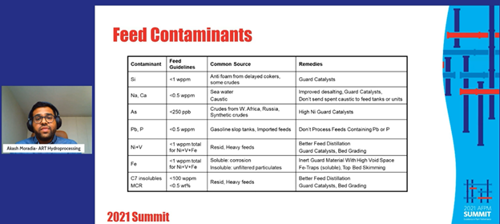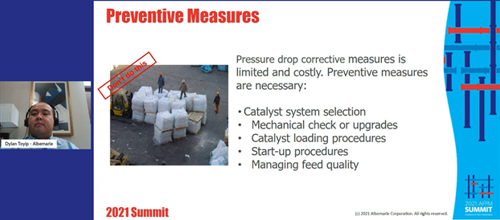2021 AFPM Summit Virtual Edition: Optimizing hydroprocessing: Effective steps to monitor, troubleshoot and ensure optimal operations
LEE NICHOLS, Editor-in-Chief/Associate Publisher, Hydrocarbon Processing
Emergency procedures, unit monitoring and troubleshooting hydroprocessing units were the focus of a Tuesday afternoon technical session at the American Fuel and Petrochemical Manufacturers (AFPM) Summit. Held virtually, the conference focused on emerging process technologies, process safety, reliability, leadership and techniques to optimize refining and petrochemical plant operations.
The technical session, “Hydroprocessing: Back to Basics—Part 1 and 2,” was moderated by Montri Vichailak, Hydroprocessing Technologist, Marathon Petroleum Corp., and Wendy Wildenberg, Senior Technical Lead, Flint Hills Resources. The session focused on optimizing operations of hydroprocessing units. The discussion featured three presentations from experts in hydroprocessing unit operations: Akash Moradia, Technical Service Manager, Advanced Refining Technologies; Dylan Toyip, Technical Sales Account Manager, Albemarle; and Brian Green, Refining Engineer, Marathon Petroleum Corp.
Moradia focused his presentation on performance monitoring and troubleshooting challenges in hydoprocessing unit performance. These concepts were highlighted by several case studies to discover and diagnose unit operational challenges and build solutions to ensure optimal unit performance.
To diagnose problems with hydroprocessing units, workers must first begin with the unit’s feed and conditions and work through other operating steps. Several key operating conditions personnel should look for include:
- Operating conditions: Compare actual to expected
- Fee properties
- Federate/liquid hourly space velocity
- Recycle gas rate and purity
- Hydrogen availability
- Hydrogen sulfide in treat gas
- Operating temperature profile.
Moradia provided six case studies on how to diagnose and create solutions to challenges in hydroprocessing units. These case studies focused on feed composition changes, recycle gas purity, hydrogen availability, over-treating and contaminants (FIG. 1) affecting catalysts use (e.g., coke buildup on the active catalyst).

FIG. 1. Feed contaminants that can affect hydroprocessing unit operations.
Moradia’s presentation was followed by Toyip’s presentation focused on pressure drop issues in hydroprocessing units, along with plugging identification, preventive and corrective measures, and commercial case studies on pressure drop issues. “Pressure drop issues can be attributed to six categories,” said Toyip. “These include catalyst fines, fines in the feedstock, excessive coking, deposition of metals, polymerization and gumming, and mechanical failure.”
Since pressure drop corrective issues are limited and costly, preventive measures are imperative to ensure optimal hydroprocessing unit performance. Toyip offered several preventive measures (FIG. 2), including:
- Catalyst system selection
- Mechanical check/upgrades
- Catalyst loading procedures
- Startup procedures
- Managing feed quality.

FIG. 2. Pressure drop preventive measures.
The final presentation was conducted by Green, whose presentation focused on emergency shutdown procedures for hydroprocessing units. Several items should be considered during shutdown, including hydrogen, environment, temperature and pressure. Green provided four possible causes of emergency unit shutdown and how they should be properly conducted. These included the following scenarios:
- Loss of a feed pump
- Loss of makeup compressor of sourced hydrogen
- Loss of both the recycled gas compressor and makeup compressor
- Loss of the recycled gas compressor.
Although not covered in his presentation, Green listed several other reasons that would cause an emergency shutdown of a hydroprocessing unit. These include furnace tube failure, exchanger tube failure and fuel supply failure, among others.
The AFPM Summit continues through Wednesday. To access news and editorial from the AFPM Summit, visit the Conference News tab on the homepage of www.HydrocarbonProcessing.com.






Comments